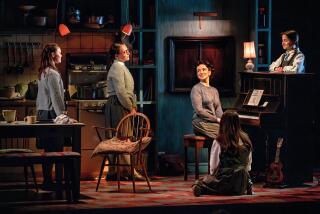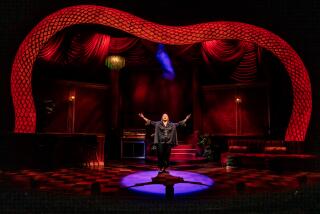STAGE REVIEW : ‘Dragon Lady’ Drama Mired in the Suburbs
Non-critics sometimes ask critics--between the usual “why-didn’t-you-like-that?” queries--what it is they look for in a work. Seeing Robert Daseler’s “Dragon Lady,” his new, and very first, play at South Coast Repertory’s Second Stage (and part of SCR’s California Play Festival), triggered this critic’s own self-inquiry. A kind of laundry list, so to speak.
Story? It doesn’t have much of one, but good plays often don’t. Characters? It has, perhaps, two interesting people, yet some fine plays only have one. Drama? Not much in a play about ennui in the L.A. suburbs--besides, a good deal of 20th-Century drama isn’t about “drama.”
Still, “Dragon Lady” is beset by a problem that drags it down, down below what it could be. It has to do with the last two remaining items on the laundry list.
Did the play evoke something? An emphatic “yes.” That is because Daseler has absolutely captured the language of the desultory, educated California upper-middle class, and with it, a whole set of attitudes that come out of the language. In a way, the drive behind “Dragon Lady,” what made Daseler write it, was to capture that world.
Which is the problem. Did the play resonate--that is, did it follow you out the theater door, and back home? An emphatic “no.” In “Dragon Lady,” the line or observation or detail of the moment is all, but once it’s gone, it’s not terribly missed.
This makes for a frustrating experience, because so many of those moments are lively. Margo (Robin Pearson Rose), an editor and quietly despairing wife of a PR executive (Richard Doyle), is able to bolt from one conversation subject to another with unique and believable skill. Listen, for example, to how she gets a house party on the subject of death. Or how she desecrates New England, and what evidence she summons for her argument. This woman belongs in the Bloomsbury circle, not in the Inland Empire.
Part of Daseler’s point is that the sum of this impressive woman is a bunch of missed opportunities. And that is why Margo, at 41, is preoccupied with growing old. Her own preoccupation, in turn, partly blinds her to husband Alex’s own desire to grasp what may be his last opportunity: a PR post in Boston. To this point in the play, Daseler is elegant in his logic.
The tension, if one can call it that, is between the evident intelligence of these people (including Alex and Margo’s friends, Hal Landon Jr.’s Paul and Julie Fulton’s Nan) and their inability to make a decision. Some playwrights would tap this for comedy, while others might make the play about the waiting for the decision. Daseler falls somewhere in between--in a crack, really. He’s as dry as Margo (but not as cynical), and as indecisive. If the playwright doesn’t make a move, who will?
Not that it’s crucial to know that Margo and Alex are moving to Boston. But because one moment hasn’t resonated to the next, we finally care less than we should.
Jerry Patch’s production certainly doesn’t let us begin in such an emotional vacuum. In one of the most beautiful openings to a show in memory, the pre-opening lights are on George Segal-like sculptures of a husband and wife, placed in set designer Cliff Faulkner’s modestly stylish living/dining room set. The lights fade down, and when they fade back up, there are Rose and Doyle in the same positions as the sculptures.
The only other facet of play or production which delivers such a poetic sense of human mortality is Rose’s performance, which embodies the notion that good acting is knowing what not to give away. Seldom do actresses have a chance to delve into a contemporary woman whose brain is forever ticking. Rose uses every moment.
Fulton has Nan trying to play catch-up with Margo, and hiding a burning envy inside that’s only hinted at in the script. Doyle’s Alex, a middle-aged boy, looks absolutely serious when he talks about determining “my career.” Landon emphasizes the hunter in Paul, which helps us believe why Margo willingly becomes the hunted.
But that suggests that “Dragon Lady” (the title refers to Margo’s office nickname) involves some danger. It is a bit too precious for that, like Eric Allaman’s too-delicate string music. It doesn’t breathe fire, and it nearly loses air.
At 655 Town Center Drive, Costa Mesa, on Tuesday through Friday, 8:30 p.m., Saturday, 3 and 8:30 p.m., Sunday, 3 and 8 p.m., May 17 and 19, 8:30 p.m., May 21, 3 and 8 p.m. Ends May 21. Tickets: $20-$25; (714) 957-4033.
More to Read
The biggest entertainment stories
Get our big stories about Hollywood, film, television, music, arts, culture and more right in your inbox as soon as they publish.
You may occasionally receive promotional content from the Los Angeles Times.










